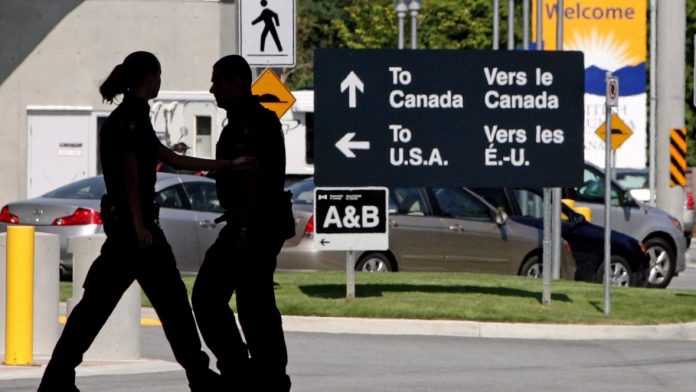Canada has introduced new legislation that will expand the authority of US customs and border officials who work at Canadian airports handling the preclearance security checks of Canadian passengers boarding US-bound flights.
The move is likely to affect the rights Canadian travellers according to civil liberties groups
Bill C-23, or the Preclearance Act of 2016, bestows on the US Customs and Border Protection (CBP) officers handling security checks of Canadian passengers, wide ranging powers such as
- Authority to carry firearms
- Conduct strip search
- Authority to detain Canadians if they withdraw from the security procedures
The bill was introduced in the parliament last year and received royal assent this week, clearing the way for it to become a law soon.
Tim McSorley, national coordinator for International Civil Liberties Monitoring Group (ICLMG), a national body of civil society organisations, said that the new law has been introduced “at the cost of the rights of travellers” .
Law For Better Security At Cost of Canadian Travellers’ Rights
Certain major Canadian airports today allow Canadian travellers to go through US Customs and Border Protection procedures before they board flights to the US. The same pre-clearance procedures are also available for those using the ferries between the US and Victoria.
McSorley acknowledged that “preclearance makes sense” with over 400,000 travellers crossing the Canada-US border daily, but pointed out that the new law may “open things up to greater escalation of problems”.
CBP currently has over 600 officers deployed at 15 locations across Canada, Aruba, The Bahamas Ireland, and the United Arab Emirates who conduct preclearance procedures. US officials have stressed the importance of these officials for ensuring national security.
R Gil Kerlikowske, the commissioner of the customs and border agency, has said that the expansion of preclearance will further improve “our ability to identify those who may pose a national security threat prior to encountering them on US soil.”
New Law Outcome Of Agreement between Canada And the US
In February this year, Canadian Prime Minister Justin Trudeau and the US President Donald Trump agreed to expand preclearance procedures to more cities in both countries. The decision follows the signing of the Land, Rail, Marine and Air Transport Preclearance Agreement in 2015 by their predecessors Stephen Harper and Barack Obama.
The benefits for Canada includes increased security, faster travel, and a boost to trade between the two countries, according to Ralph Goodale, Canada’s minister of public safety and emergency preparedness.
The regulations are expected rolled out for air travel by the end of 2018. Similar procedures for road, rail and marine travel will be introduced later.
US Officials Granted Sweeping Powers
Legal experts and civil rights groups are worried that the bill gives US officers a lot more power to hold Canadian travellers even when in Canada.
Under the present system, a Canadian traveller who is undergoing the clearance procedures can withdraw from it if they are not comfortable with their interaction with a US official. However under Bill C-23, US officers can hold and question the travellers to identify them or to determine their reason for withdrawing .
US preclearance officials also have authority to detain a Canadian traveller if there are reasonable grounds to believe that a traveller for the US ”poses a risk of significant harm to public health”. Since the officers are not allowed to make arrests , they will be liaising with Canadian border officials for further action, McSorley said.
According to McSorley the concern was that problems can escalate since under the new law “withdrawal isn’t grounds for suspicion”.
Under the new law, Canada will be establishing its first preclearance areas within the US. There are concerns that the legislation can permit Canadian officials to refuse re-entry to Canadian permanent residents.
If denied entry, permanent residents may have to re-enter Canada via a land crossing, which can result in additional anxiety and costs. McSorley pointed out that there were no “explicit limitations” with respect to sharing of information with US officials at the airport.
No Recourse For Action Against US Authorities If Rights Breached
Canada has vowed that US preclearance procedures would be in line with Canadian law, which will include the provisions of Canadian Charter of Rights and Freedoms.
The Canadian Muslim Lawyers Association (CMLA), however pointed out that Canadians have no scope to hold US preclearance officers or even the US government accountable for any breach of their rights under Bill C-23.
According to the association, the law grants “explicit blanket immunity” to US preclearance officers for anything occurring while exercising their powers. The US government is also immune barring cases of bodily injury, death or property damage.
McSorley echoed these concerns pointing out that there should be “clear way for a Canadian to seek a legal remedy” in case they feel any of their rights have been violated.
Critics Question Necessity For New Law
A more fundamental question being asked by critics is whether Bill C-23 is necessary at all.
Canadian Bar Association representatives noted in a statement that the law “unnecessarily and unjustifiably “ is sacrificing the rights of Canadians.
The statement further pointed out that the free flow of goods and people between the two countries need not to be ” at the expense of Canadians’ rights”.
McSorley also stated that there was no need to change preclearance laws that have existed between Canada and the US for years now without any issues.



